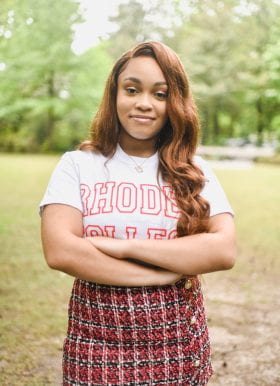
Cabria Shelton, BS
Neuroprep Trainee
Cabria Shelton recently graduated from Rhodes College, Class of 2023, where she majored in Health Equity. Throughout her academic career, Cabria has been passionate about ending health disparities and improving mental health outcomes in disadvantaged communities. Her favorite Health Equity class was History 105: Black Women’s Activism, where she learned about the contributions of Black women to the fight for equal rights. Cabria’s interest in science was piqued during her microbiology class, where she fell in love with spending time in the lab and decided to pursue biomedical research long-term.
In the summer of 2022, Cabria completed genetic research in the Opportunities in Genomic Research program at Washington University in Saint Louis. In Dr. Peter Jin’s lab, she studied the genetics of a rare congenital heart disease, patent ductus arteriosus, using whole genome sequencing. At Rhodes, Cabria completed a year of biochemistry research in the Molecular Immunotherapeutics Research (MIR) lab under Dr. Shana Stoddard, focusing on protein engineering of synthetic binding proteins with applications to novel therapeutics for cancer, neurological disorders, and autoimmune disorders.
Cabria’s long-term career goal is to pursue a Ph.D. in Neuroscience (or Genetics) and explore the molecular genetics and neural correlates of schizophrenia and post-traumatic stress disorder in marginalized groups, especially Black women. In her free time, Cabria enjoys spending time with her dog, Missy, roller skating, and being in nature.
Neuroprep mentor: Janine Bijsterbosch, PhD

Using population datasets such as the UK Biobank, the Personomics Lab adopts cutting edge computational techniques to improve the interpretability and reliability of resting state functional connectivity networks and investigate multimodal brain correlates of mental health disorders such as depression.
Cabria’s current research project focuses on the role of head motion on depression phenotypes from structural MRI brain images in the UK Biobank. She is conducting her experiment using Python and various statistical analyses.